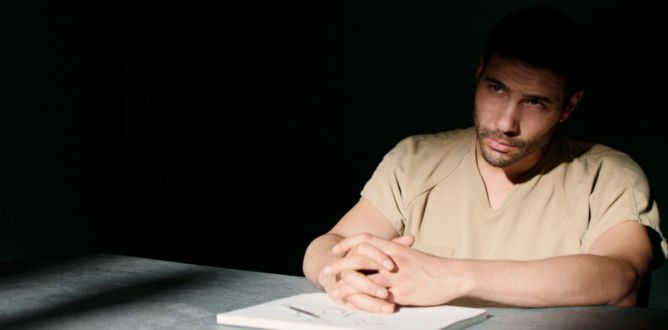The Mauritanian Parent Guide
Painful to watch, this is nonetheless an instructive film for mature viewers thanks to its skilled treatment of complex issues.
Parent Movie Review
After the horrors of 9/11, President George W Bush declared “Our war on terror begins with al Qaeda but it does not end there. It will not end until every terrorist group of global reach has been found, stopped, and defeated.”
Caught up in this massive worldwide manhunt is Mohamedou Ould Slahi (also spelled Salahi and played by Tahar Rahim), a German-trained engineer living in his West African homeland of Mauritania. Having fought against the Soviets in Afghanistan in the 1990s, Salahi has acquaintances amongst the mujahideen and jihadists, including a cousin in al Qaeda. When his cousin calls him on Osama bin Laden’s phone, Salahi’s fate is sealed. He’s picked up by local police, transferred to US black sites in Jordan and Afghanistan, and finally shipped off to Guantanamo Bay in Cuba where his life will intersect with two American lawyers.
Stuart Couch (Benedict Cumberbatch) is the military prosecutor chosen to lead the case against Slahi. The Marine is a straight arrow who lost a friend in 9/11 and is determined to secure justice for the family. But as he digs deeper into the case, he becomes increasingly uneasy over the way Slahi has been interrogated…
On the other side is Nancy Hollander, a fiercely determined attorney who specializes in international and human rights law. As a favor to a colleague, she takes on Slahi’s case (for free) and begins what will become years of trips to Cuba to meet with her client. In between her visits, he writes to her, explaining his background and his experiences at “Gitmo”.
The Mauritanian is a hard film to watch. There are horrendous scenes of torture, some of which are sexualized. Waterboarding is used, and Slahi is even taken out to sea where his head is pushed under the water. Watching American service personnel don Halloween masks and beat, kick, and abuse a detainee who has not even been able to defend himself in court is blood-chilling. Seeing an officer threaten to arrest a man’s mother and have her raped is nauseating. These scenes are a reminder of the words of the late Senator John McCain, who was tortured by the North Vietnamese: “The use of torture compromises that which most distinguishes us from our enemies, our belief that all people, even captured enemies, possess basic human rights.”
When you add plentiful profanity to the disturbing violence, The Mauritanian clearly isn’t a good choice for family movie night. It is, however, an instructive film for adults and mature teens, thanks to the complex issues it raises. Couch, despite his reservations about the interrogations, is convinced that Slahi is guilty. (“The Al-Qaeda Forrest Gump. Everywhere you look he’s there.”) Hollander is less concerned with Slahi’s guilt or innocence; her single-minded focus is on ensuring that Slahi receives due process. As both lawyers uncover the extent of torture perpetrated at Guantanamo, they are forced to grapple with the question at the heart of the film: Does one best defend the USA by upholding the principles of its constitution or by pursuing its enemies at all costs, even if that involves using methods that undermine the constitution itself?
Thankfully, the cast is up to the task of humanizing what could otherwise be abstract debates. Jodie Foster is perfectly cast as Nancy Hollander, wedding a no-nonsense practicality to her passion for the rule of law. And Benedict Cumberbatch ably portrays Couch’s dedication, although hearing a Southern accent come out of his mouth is a bit, shall we say, unsettling. But the real star of the show is Tahar Rahim, who offers an exceptional performance as Slahi, by turns bewildered, angry, frustrated, and terrified, yet somehow retaining a quiet dignity. His ability to absorb the horrors perpetrated against him and yet somehow forgive his guards is a powerful call to a world caught in cycles of hatred and revenge.
Directed by Kevin Macdonald. Starring Tahar Rahim, Jodie Foster, Benedict Cumberbatch. Running time: 129 minutes. Theatrical release February 12, 2021. Updated October 2, 2021Watch the trailer for The Mauritanian
The Mauritanian
Rating & Content Info
Why is The Mauritanian rated R? The Mauritanian is rated R by the MPAA for violence including a sexual assault, and language
Violence: There are mentions of terrorist attacks on 9/11. Multiple scenes of torture are shown, including waterboarding and a man being punched and kicked. The man is seen bleeding in the shower and with blood and scars on his head and body. He is shown sitting in a wheelchair with bloody wounds. His blood is forcibly taken in a medical context. A man mentions Russians kidnapping and raping Afghani women. There is mention of suicide. Protesters knock a person over. A detainee is chained and has his head covered with a hood. There is mention of people having their throats slit during a hijacking. A man seems to be trying to smother himself. There are scenes of a man being tortured with cold, stress positions, loud heavy metal, and beatings. A detainee is force fed food. A man is taken out in a boat and his head is forced under water
Sexual Content: A masked woman tries to seduce a shackled prisoner; she straddles him and taunts him. A man hallucinates and remembers sexual activity with his wife (no explicit content). A man is told his mother will be arrested and raped.
Profanity: There are just under three dozen sexual expletives in the movie, along with some scatological curses, a few terms of deity, and a handful of mild profanities.
Alcohol / Drug Use: People drink alcohol at a wedding. Main characters drink alcohol in social settings. A few adults smoke cigarettes.
Page last updated October 2, 2021
The Mauritanian Parents' Guide
Do you think Slahi was guilty or innocent? Why or why not? Do you think his treatment at Guantanamo should have invalidated his confession? Do you think that confessions can be tainted by torture or duress? What do you think the Eighth Amendment means when it forbids “cruel and unusual punishment”?
Why does Nancy Hollander choose to defend people charged with terrorism? Check out her New York Times op-ed on the topic here: A Terrorist Lawyer, and Proud of It
Torture is a key issue in the film and its use in the War on Terror remains controversial. The following articles raise different aspects of the debate:
The Washington Post: Bin Laden’s death and the debate over torture (by John McCain)
The Washington Post: What John McCain Taught Us About Torture
The Atlantic: Antonin Scalia’s Case for Torture
The Guardian: CIA torture architect breaks silence to defend “enhanced interrogation”
The New York Times: What the CIA’s Torture Program Looked Like to the Tortured (Caution: disturbing content)
The New York Times: How US Torture Left a Legacy of Damaged Minds
Human Rights Watch: Guantanamo’s Ugly Taint on US Diplomacy
The Washington Post: This is how it feels to torture
The Washington Post: An Iraq Interrogator’s Nightmare
The summary of the Senate Intelligence Committee’s report on torture is available online:
Loved this movie? Try these books…
For Mohamedou Ould Salahi’s own story, you can read his book, Guantanamo Diary, co-authored by Larry Siems.
More stories about life in detention are told by Manvish Khan, an American lawyer and translator, in My Guantanamo Diary: The Detainees and the Stories They Told Me.
The CIA’s use of torture did not begin with 9/11. Alfred McCoy details its long history in A Question of Torture: CIA Interrogation from the Cold War to the War on Terror.
For an accessible look at a complex topic, you might want to try Sid Jacobson and Ernie Colón’s graphic novel, The Torture Report.
One of America’s most outspoken opponents of torture was the late Senator John McCain. In his memoir (written with Mark Salter), Faith of My Fathers, McCain describes his heritage of military service and his experience being tortured by the North Vietnamese during the war. In The Restless Wave, the Senator’s final book, he shares his ongoing concerns about the damage done to the United States by the practice of torture.
Home Video
The most recent home video release of The Mauritanian movie is March 5, 2021. Here are some details…
Related home video titles:
The US Senate investigated the torture of prisoners in Guantanamo Bay. The story of its work is told in The Report.
The events of 9/11, the event that ultimately led to the establishment of the Guantanamo prison, are told in 9/11, The World Trade Center, and United 93.
How do people survive years of imprisonment; even abuse and torture? Enduring decades in South Africa’s penal system, Nelson Mandela eventually became the country’s first Black president. His story is told in Mandela: Long Walk to Freedom. In Invictus, Mandela shares how he retained his sense of self while in prison.
Men survived torture in Japanese prisoner of war camps, only to struggle with the psychological after effects in Unbroken and The Railway Man.


